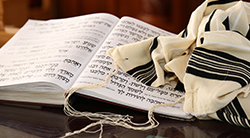
The slogan for the Torah portion known as Yitro should be “we’ve arrived.” The theophany on Mount Sinai – God’s Revelation of the Ten Commandments – is arguably the climax of the Torah (Exodus 20). But the story doesn’t end here – it is the post-Sinai textual journey where we learn that we exist in a perpetual state of arrival, constantly figuring out how to hear Torah as we walk through our daily lives.
Immediately after the awesome experience of hearing God from the foot of Mount Sinai is behind them, God tells Moses to instruct the people on how to set up divine worship. From the Torah’s perspective, worship (or “service,” avodah in Hebrew) of God is the ultimate symbol of freedom. The forced service of Pharaoh is replaced by the voluntary entrance into a covenant to serve the Eternal. From the beginning of the confrontation with Pharaoh, we knew that a worship experience would be the ultimate outcome of the command: “Let My people go that they may worship [or “serve”] Me” (Ex. 7:16).
By reaffirming the first and second commandments, Exodus 20:19-23 illustrates the way core theology is made tangible in practice:
(19) The Eternal One said to Moses: Thus shall you say to the Israelites: You yourselves saw that I spoke to you from the very heavens: (20) With Me, therefore, you shall not make any gods of silver, nor shall you make for yourselves any gods of gold. (21) Make for Me an altar of earth and sacrifice on it your burnt offerings and your sacrifices of well-being, your sheep and your oxen; in every place where I cause My name to be mentioned I will come to you and bless you. (22) And if you make for Me an altar of stones, do not build it of hewn stones; for by wielding your tool upon them you have profaned them. (23) Do not ascend My altar by steps, that your nakedness may not be exposed upon it.
The God of the heavens has no physicality: this God cannot be represented by idols, nor can this God be restricted to one place. Even when King Solomon builds the First Temple in Jerusalem, this idea that God is everywhere is not supplanted (I Kings 8:27-29).
While the essence of worship emphasizes God’s incorporeality, the Torah understands that being thoughtful about physicality – in terms of structures and behaviors – is needed for the human-divine communion.
There are two theological teachings implicit in the instructions about the altar’s material construction. In vs. 21, we learn, according to the biblical scholar, Professor Nahum Sarna, that “God is content with a simple earthen altar and requires no elaborate structure” (The JPS Torah Commentary: Exodus, p. 116). But if one’s situation allows for building a more permanent structure, one made of stone, the stone cannot be hewn using tools made of iron (see Deut. 27:5). We might understand this prohibition better by examining the Hebrew word, cherev, translated by the new JPS Torah translation (used in the Plaut commentary) as “an iron tool.” In the biblical text, the word is cherev can also mean “sword.” The word’s association with weaponry is the basis for Mishnah’s explanation of the biblical law: “…for iron was created to shorten a person’s days, while the Altar was created to lengthen a person’s days: what shortens may not rightly be lifted up against what lengthens” (Mishnah, Middot 3:4).
To enforce the idea that the Altar is in a sacred precinct, this section of Exodus 20 closes with another instruction about how to approach this place of worship. Modern biblical scholars understand vs. 23’s concern about exposing nakedness as a prohibition against pagan rituals involving unclothed priests. But Rashi, the 11th century French commentator (following the Rabbinic midrash on Exodus, the Mechilta d’Rabbi Yishmael), finds an expansive moral lesson in the relationship between the first part of the verse, “ascending [the] Altar by steps” and the uncovering of one’s nakedness. First, Rashi interprets what he sees as the plain-meaning (known as p’shat in Rabbinic interpretation):
…because on account of these steps you will have to lengthen your steps … Although this would not be an actual uncovering of one’s nakedness … nevertheless, lengthening of steps comes close to uncovering one’s nakedness.
Rashi’s explanation is based on his understanding that the ancient Israelites wore tunics: when approaching worshipers took large steps, they spread their legs and their tunics flared, revealing “too much skin.”
Seeing this is as more than just a teaching about “wardrobe malfunction,” Rashi extrapolates from this verse a profound lesson in how caring about respecting God means nothing if it doesn’t translate into the respect we show other human beings. Continuing from “lengthening of steps comes close to uncovering one’s nakedness,“ he explains:
And you would then be treating them [the stones of the Altar] in a disrespectful manner. And this leads to an a fortiori argument [known as kal v’chomer in Talmudic teaching]: Just as in the case of these stones that have no knowledge [or, sense] to pay attention to disrespect and the Torah states there is a need to behave towards them in a manner that is not disrespectful, your companion [i.e., another human being] who is [created] in the image of your Creator, and who pays attention to disrespect, how much the more so!
In response to the current volatility surrounding the Kotel, these texts need to be retaught and relearned. First and foremost, while the Kotel’s historic significance in Jewish religious history assigns special status to this ruin, core Jewish theology would have us believe that it is no more spiritual than any other place where one truly seeks the Divine. Second, if we don’t appreciate the stones’ symbolic value for teaching about affirming life through being respectful and kind to each other, we are missing the point.
When it comes to Israel, we should learn to be more mindful about the ways we allow our fixation on historical place and space distract us from getting to the Jewish heart of the matter, which is to be caring human beings tasked with creating spaces that are worthy of the Divine Presence. Yehuda Amichai (1924-2000), the Israeli poet whose prolific verse articulates so many of the profound questions related to modern Israel’s “growing pains,” teaches this very lesson at the end of one his most well-known poems, “The Tourists”:
Once I sat on the steps by a gate at David's Tower,
I placed my two heavy baskets at my side. A group of tourists
was standing around their guide and I became their target marker. "You see
that man with the baskets? Just right of his head there's an arch
from the Roman period. Just right of his head." "But he's moving, he's moving!"
I said to myself: redemption will come only if their guide tells them,
"You see that arch from the Roman period? It's not important: but next to it,
left and down a bit, there sits a man who's bought fruit and vegetables for his family."
Rabbi Reuven Greenvald is the director of Israel engagement for the Union for Reform Judaism (URJ).
 Worrying that because of their similarities, Harry Potter might be destined for the same evil darkness as the villain, Voldemort, Harry’s beloved mentor, Dumbledore, assures him, “It is our choices, Harry, that show who we truly are, far more than our abilities” (J. K. Rowling, Harry Potter and the Chamber of Secrets). We are defined by our choices: This is the central theme of J.K. Rowling’s “Harry Potter” series. We choose love over anger, courage over ignorance, friendship over solitude, what is right over what is easy.
Worrying that because of their similarities, Harry Potter might be destined for the same evil darkness as the villain, Voldemort, Harry’s beloved mentor, Dumbledore, assures him, “It is our choices, Harry, that show who we truly are, far more than our abilities” (J. K. Rowling, Harry Potter and the Chamber of Secrets). We are defined by our choices: This is the central theme of J.K. Rowling’s “Harry Potter” series. We choose love over anger, courage over ignorance, friendship over solitude, what is right over what is easy.
Choice is also a defining theme of the story of the Jewish people. In Parashat Yitro we learn that if they choose to faithfully obey God and keep God’s covenant the Israelites will be God’s “treasured possession among all the peoples” (Ex. 19:5). God’s treasured possession, God’s am s’gulah, God’s Chosen People. At this moment of receiving the Torah at Sinai, of entering into a sacred covenant, we are taught that chosenness itself is a choice. If we choose Torah, if we choose God, if we choose covenantal community, then we will be chosen, treasured, holy. And it is this communal commitment of accepting Torah at Sinai that defines the character of the Jewish people. We choose Torah, God, commandedness, covenant, community.
If the character of the Jewish people is defined by choosing chosenness, then it is this chosenness – our holy acts and the light that we bring forth – that defines who we are. In Ex. 20:23 God instructs Moses to tell the Israelites, “Do not ascend My alter by steps, that your nakedness may not be exposed to it.” As Rabbi Greenvald explains, Rashi understands that the ancient Israelites would have worn tunics, thus if they were eager to reach the alter, running up those entry steps two at a time, they ran the risk of having their tunics flare out. However, Rashi goes on to make a more profound point; God is not truly concerned with potential wardrobe malfunctions, but rather with the way that we all interact with the objects that enable us to do God’s work on earth. Our attention to these mere things, these tools, these stepping stones, reflects the choices that we make about how we treat our fellow humans. The heart of this commandment is that our purpose as chosen people is to choose to create covenantal relationships that are worthy of being chosen by God.
Rabbi Jade Sank Ross is the Assistant Rabbi at Congregation Emanu-El of Westchester in Rye, NY.
Yitro, Exodus 18:1-20:23
The Torah: A Modern Commentary, pp. 508-565; Revised Edition, pp. 468-506
The Torah: A Women’s Commentary, pp. 407-426
Haftarah, Isaiah 6:1-7:6; 9:5-6
The Torah: A Modern Commentary, pp. 710-713; Revised Edition, pp. 507-509
Explore Jewish Life and Get Inspired
Subscribe for Emails

